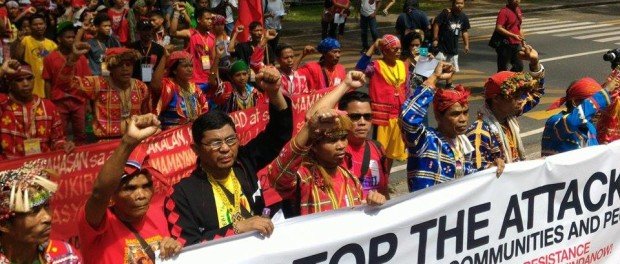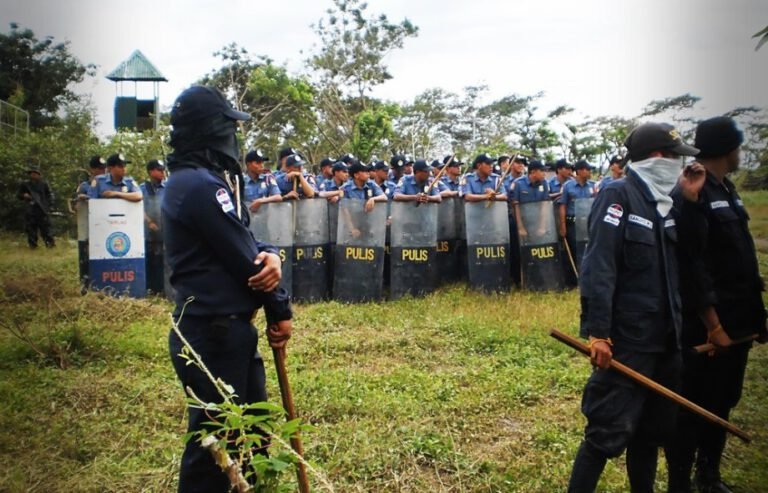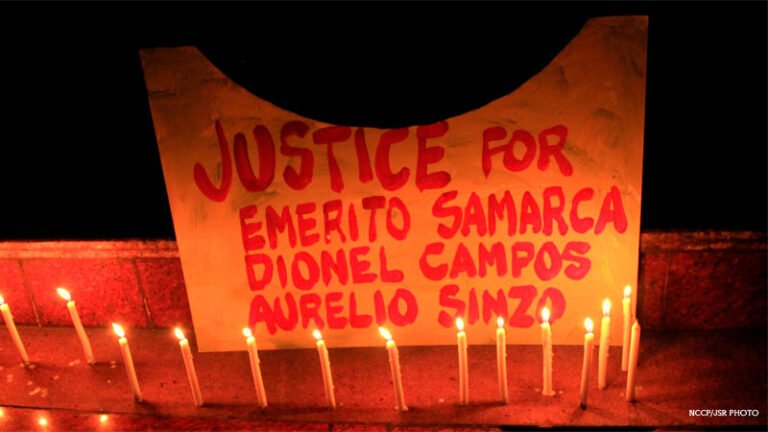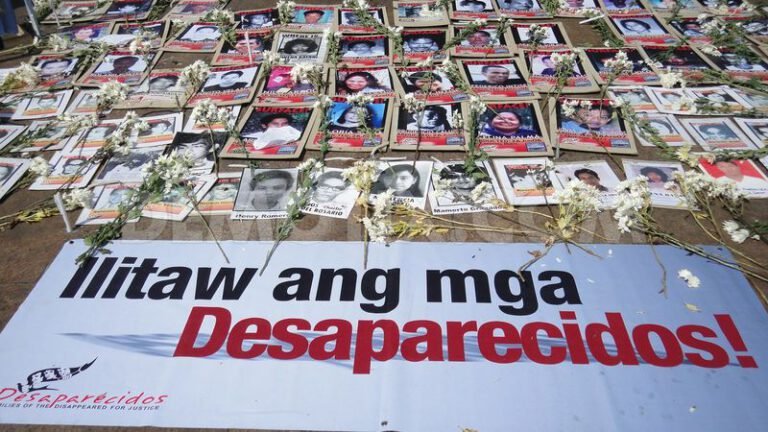“Just like the Commission on Human Rights (CHR), the Armed Forces of the Philippines (AFP) and the rest of the BS Aquino agencies, the Department of Justice (DOJ) has been a party to the commission of human rights by implementing Oplan Bayanihan, particularly in filing false charges against activists and in deodorizing the crimes of the regime,” Karapatan secretary general Cristina Palabay said today as the Manilakbayan 2015 contingent from Mindanao staged a protest action in front of the Justice department.
A few weeks after being appointed as Justice Secretary, Alfredo Caguioa’s office was stormed by more than 500 Lumad and Mindanawon with human rights group Karapatan and members of progressive people’s organizations. The protesters slammed the DOJ’s role in the continuing systematic violations
of human rights among peasant and Lumad communities.
“The pattern of non-prosecution of murderers and torturers in the military and paramilitary groups, and the filing of trumped up charges against known leaders of Lumad and of progressive organizations are the key roles of the DOJ in Oplan Bayanihan. It has used the legal system to promote the climate of impunity in the Philippines and to violate the rights of human rights defenders and political activists,” Palabay said.
Karapatan noted that among the cases filed and pending at the DOJ are the murder of Italian priest Fr. Fausto Tentorio, the massacre of the Capion family, and the September 1 massacre of school executive Emerito Samarca, Lumad leaders Datu Juvello Sinzo and Dionel Campos. “None of those who pulled the trigger and the mastermind among the State security forces were actually arrested or even faced trial. The DOJ’s deliberate inaction on these cases has furthered the climate of impunity, encouraging further rights violations in Mindanao and all-over the country,” Palabay continued.
“During meetings and hearings the DOJ would often cite the many difficulties encountered with the PNP and AFP on the arrest of perpetrators among the military and paramilitary groups. Isn’t that the raison d’etre of the DOJ-led inter-agency task force? What’s the use of the PNP and the AFP sitting in the task force for “effective coordination”? This task force has accomplished nothing as far as conviction of State perpetrators of rights violations. It has only succeeded in exonerating high officials responsible for killings and other rights abuses and in wasting public funds,” she added.
Palabay explained, “DOJ is part of the regime’s Cabinet Cluster on Security, Justice and Peace with the AFP and the PNP. It has taken on the role of protecting State forces rather than dispensing justice to the victims of the State.” In few instances that it was compelled by strong public opinion to accede to the victims’ cries for justice, high officials of the military were freed from accountability and the cases filed against ordinary soldiers are almost always lower in degree than the actual crimes committed.
“Even the dirty scheme of filing trumped up cases against tribal leaders and human rights advocates is part of Oplan Bayanihan’s program to harass, illegally arrest, and imprison members and leaders of progressive people’s organizations. The DOJ essentially has taken over Gloria Arroyo’s Inter-Agency Legal Advisory Group (IALAG),” Palabay said.
In June, 22 churchpeople, human rights workers and victims of rights violations were falsely charged with criminal offense by the Philippine National Police in Socsksargen (South Cotabato-Sultan Kudarat-Sarangani and Gen. Santos City). These 22 individuals are leaders of groups which assisted the evacuees and those who participated in a fact-finding mission in Sitio Akbual, Brgy. Upper Suyan, Malapatan, Sarangani province. The mission was held to investigate the human rights abuses committed by the 73rd Infantry Battalion-Philippine Army (IBPA) against the Blaan tribe.
In Davao City, 15 Lumad leaders and human rights advocates were also falsely charged with kidnapping, illegal detention and human trafficking for ‘holding’ the Lumad evacuees at the United Church of Christ of the Philippines-Haran while 55 other leaders from the National Capital Region and Southern Mindanao were also implicated via a rogue gallery of the AFP. The charges were eventually dismissed for lack of evidence.
“The DOJ is responsible for the fabricated criminal charges against the 555 political prisoners, hounded by tortuous legal proceedings, barefaced maneuvers of the military, and repressive and inhuman conditions in jail. With the new Justice Secretary, who was Aquino’s classmate and Chief Presidential Legal Adviser, such violations are expected to continue,” Palabay said.
“The DOJ could only dispense an iota of justice to the victims of human rights violations if it acknowledges it is part of the State’s policy to arrest, detain, and kill people as it implements Oplan Bayanihan. There is no middle ground to justice. There are only the perpetrators and the victims. And in our case, the poor majority of the Filipino people are often the victims of state-perpetrated violence,” said Palabay.
Reference:
Cristina “Tinay” Palabay
Secretary General
+63917-3162831
Angge Santos
Media Liaison
+63918-9790580
———————————————————————
PUBLIC INFORMATION DESK
publicinfo@karapatan.org <publicinfo@karapatan.org>
———————————————————————
Alliance for the Advancement of People’s Rights
2nd Flr. Erythrina Building
#1 Maaralin corner Matatag Streets
Central District, Diliman,
Quezon City, PHILIPPINES 1101
Telefax: (+63 2) 4354146
Web: http://www.karapatan.org
KARAPATAN is an alliance of human rights organizations and programs, human rights desks and committees of people’s organizations, and individual advocates committed to the defense and promotion of people’s rights and civil liberties. It monitors and documents cases of human rights violations, assists and defends victims and conducts education, training and campaign. It was established in 1995.








